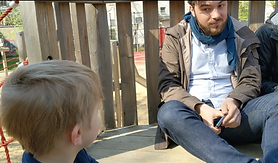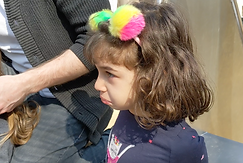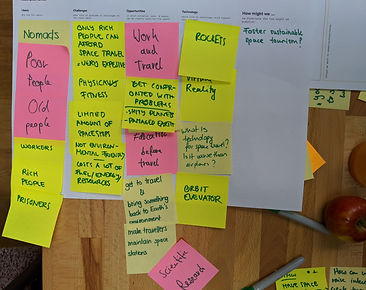esra günlü kılıç
experience designer ( UX, IxD, ID, Usability )
SERVICE DESIGN
Space Camp
Research, Ideation, Exploration with creative thinking methods (Crazy 8's, Associative Thinking, Analogies, Card Sets), Visual mapping, Persona, Idea Validation, Storyboarding, Paper Prototype, Presentation
3 days
Service Design Jam 2019
Service Design
What I did :
Sector :
Activity :
Time :
Challenge :
Designing an appealing service design idea inspired from the term 'Blue'
In 2019 I attended to the event Global Service Jam in Cologne. This event is an international 3-days workshop that happens in 100 cities all over the world at the same time. It is the world's biggest design focussed innovation event. A service Jam is a cooperative gathering of people interested in a design-based approach to creativity and problem solving, and of course in service design. Its aim is to encourage experimentation and innovation In a Jam participants come together without a team, without an idea and are given a subject or theme to generate ideas about in teams. After the concept generation, they improve, prototype, test with people, present their designs and all share these ideas with the world over a central platform.


First Day
In the first day , the topic was given and it was; "blue. Turning this very general concept into an design idea necessitated several idea generation and brain storming tools. We started with Metaphor Wheel, where we explored possible metaphorical concepts in different levels of the wheel in a complete free manner. After that we tried to define some Challenges that are related to the metaphors that we defined. Through Brain Walking methods everyone added, questioned and tried to explore each groups metaphors and found challenges. We grouped and organized these challenges in terms of their thematic relations through Affinity Diagrams. Next step was to turn them into How Might We? questions. Through discussions each group voted for found HMW? questions and has chosen one that would be the main challenge that each group would seek for a solution. Each participant has chosen personally among these HMW? challenges according to their interests. Now new and final groups were defined around each different HMW? question. My groups first predefined HMW question was "How might we foster the space tourism?", which was one of my suggestions during our early attempts to define challenges. This question became so popular among participants that we end up with building two groups working around the same HMW question.



Second Day
In the second day after a lecture on Service Design, its methods and innovative idea generation techniques, we made brainstorming sessions and discussed on our possible user profiles, about their needs, contexts and all related scenarios. These first discussions were our assumptions, which we visualised in an assumption canvas, and the next step was to challenge our assumptions through user researches. Our main assumption was that children would be very interested in going to space and experiencing related activities, since we assumed that almost every child is dreaming on being an astronaut.
We stepped outside and made interviews with children and their parents. Interestingly, they didn't seem to be exactly interested in such an experience. Neither children nor parents gave very positive answers. Both groups, but especially parents were concerned about the safety. Additionally, they said that they can prefer other more enjoyable activities. This was a good experience on the importance of questioning and validation of assumptions.



We also made desk research in the internet. We came up with a different user group than we imagined at the beginning. We have seen that there are a lot of groups in all around the world who are interested in space traveling. The people in those groups are, as we have seen, mostly people who are interested in astronomy, science and science fiction. They are organizing conferences, meetings, trying to take public attention on space traveling and space related activities to convince governments to fund and businesses to invest to this topic. Thus, we have seen that there is already a big demand for space tourism. We found out also that there have been a number of space tourists until now and there are companies that are providing this service for rather big amounts of money. At the end, through desktop research we defined main characteristics of our persona, a person who is into the topics in astronomy, technology, science, science fiction, and who are not rich enough to afford such an experience.


After reframing our design problem we started to seek for solutions. We used different creation methods; i.e. Crazy 8's, Associative Thinking, Analogies and using Card Sets. At the end, we gathered and grouped all our different ideas and hang our sketches on the wall to discuss all and decide on our final solution. We came up with the idea of providing space traveling experience through a center on the earth. In our scenario this center was a place in a desert-like area (similar to moon surface) that is offering e.g. a 3 month space camp service, where it was training the people as if astronauts and providing some space traveling experience through technologies that are resembling conditions in space. We considered that the training part is also a very important part of the whole experience. This solution would also be more sustainable than a real travel, which we decided to emphasize, as well.





At the last stage, we decided to make a prototype that would be a part of our scenario and help us to test our idea as a value proposition. We imagined a game, which would be online in real case, that would challenge users' knowledge about space and astronomy in a fun way and could result with an invitation to this camp and cost reductions according to the achievement of the participant. We designed a simple paper version of this game and went into the streets to test both our idea and game with people. By chance one of our users was an astronomy-lover. She played the game and gave very positive feedback both on the game and the idea.





Third day
Third day was mainly on presenting our ideas and solutions in groups and preparing online presentation to share with the jammers in all around the world. We prepared a quick scenario movie, which was appreciated a lot by other participants of the event in terms of result and presentation.
For more information